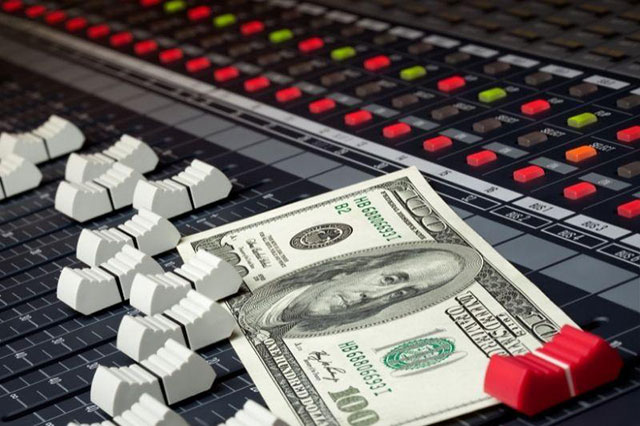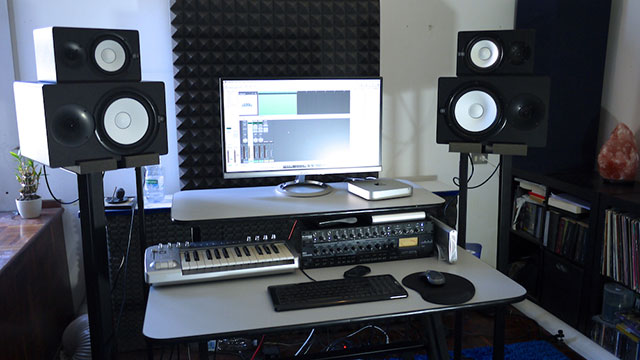 The rise of digital technology has made it possible for aspiring musicians and audio professionals to set up their recording studios at home. With the right equipment and software, it's now easier than ever to produce high-quality recordings in the comfort of one's own home. However, having a home recording studio is not enough to monetize your skills and turn your passion into a profitable business. This article will provide comprehensive information on how to monetize your home recording studio and turn it into a thriving business.
The rise of digital technology has made it possible for aspiring musicians and audio professionals to set up their recording studios at home. With the right equipment and software, it's now easier than ever to produce high-quality recordings in the comfort of one's own home. However, having a home recording studio is not enough to monetize your skills and turn your passion into a profitable business. This article will provide comprehensive information on how to monetize your home recording studio and turn it into a thriving business.
The demand for home recording studios has increased significantly in recent years as more and more artists and audio professionals seek affordable and convenient recording solutions. However, with the increase in demand comes an increase in competition, making it essential to have a solid business plan and a clear strategy for attracting and retaining clients. This article will cover everything you need to know about setting up your home recording studio, building a client base, offering professional services and monetizing your studio.
Whether you're a seasoned audio professional or just starting, this article will provide the tools and knowledge you need to turn your home recording studio into a thriving business. So if you're looking to monetize your skills and turn your passion into a profitable venture, read on to learn how to make your home recording studio a success.
The market for home recording studios has experienced significant growth in recent years as more and more musicians and audio professionals seek affordable and convenient recording solutions. This has created a demand for home recording studios, making it an ideal time to start a business in this field. However, it's crucial to understand the various types of recording studios and their target audience to be successful.
The music industry has undergone significant changes in the digital age, and home recording studios have become an essential component of the new music landscape. The rise of digital technology has made it possible to produce high-quality recordings in a home environment, which has increased demand for home recording studios. Additionally, as the cost of professional recording studios continues to rise, more and more artists and audio professionals are seeking affordable alternatives, creating a new market for home recording studios.
There are several types of recording studios, each with a different target audience. For example, some studios cater specifically to independent musicians, offering recording, mixing and mastering services. Other studios specialize in voice-over work and audio production for video and film. Still, others offer live recording services for concerts and live events.
It's essential to understand the different types of recording studios, and their target audience to determine the services you should offer and how to best attract clients. For example, if your target audience is independent musicians, it's essential to have a wide range of recording equipment and software to accommodate their needs. On the other hand, if your studio specializes in voice-over work, it's essential to have high-quality microphone equipment and soundproofing to produce top-notch recordings.
Overall, understanding the home recording studio market, the various types of recording studios, and their target audience is crucial for success. By conducting market research and understanding the needs of your target audience, you can develop a successful business strategy that will allow you to monetize your home recording studio.
 Setting up a home recording studio can be daunting, but with the right equipment and software, it can also be a rewarding and profitable venture. In this section, we will outline the steps involved in setting up a home recording studio, including equipment and software requirements, as well as tips for optimizing the sound and acoustics of the studio space.
Setting up a home recording studio can be daunting, but with the right equipment and software, it can also be a rewarding and profitable venture. In this section, we will outline the steps involved in setting up a home recording studio, including equipment and software requirements, as well as tips for optimizing the sound and acoustics of the studio space.
The first step in setting up a home recording studio is to determine your budget and the type of services you want to offer. This will help you decide which equipment and software you will need. The next step is to choose a space in your home to use as the recording studio. This space should be large enough to accommodate all of your equipment and have enough room for you to move around freely.
Once you have chosen your space, you must invest in the right equipment. This includes a computer, recording software, a digital audio workstation (DAW), audio interface, microphone, headphones and speakers. You may also want to invest in studio monitors, which are specialized speakers designed for music production.
In addition to the hardware, choosing the right recording software is important. There are many options available, including free and paid software. Some popular choices include Pro Tools, Logic Pro X, Cubase and Ableton Live. You should choose software that meets your specific needs and budget.
Once you have the equipment and software set up, it's essential to optimize the sound and acoustics of the studio space. This will ensure that your recordings are of high quality and that you can produce the best possible sound. To optimize the sound and acoustics of the studio, you should:
As discussed, setting up a home recording studio requires careful planning and consideration. With the right equipment and software and optimizing the studio space's sound and acoustics, you can produce high-quality recordings and monetize your home recording studio.
To turn your home recording studio into a profitable venture, you need to build a steady client base. You can implement several strategies to attract clients, including advertising and networking.
One of the most effective ways to attract clients is through advertising. You can start by creating a website showcasing your services and equipment and examples of your work. This will give potential clients a chance to see what you offer and determine if you're the right fit for their recording needs. In addition to a website, you can also consider advertising your studio through social media, local newspapers and magazines and even radio and TV ads.
Networking is another critical component of attracting clients to your home recording studio. Building relationships with other musicians, producers and sound engineers can lead to new clients and referrals. You can also participate in local music events and industry conferences and join relevant online forums and discussion boards. By making connections and building relationships, you'll be able to expand your network and reach more potential clients.
Once you've started attracting clients, it's essential to establish a professional image and build trust with them. This starts with having a well-equipped and organized studio and a professional demeanor when communicating with clients. Additionally, it's a good idea to set clear expectations, such as response times for emails and phone calls, studio hours and payment terms. By consistently delivering high-quality work and providing excellent customer service, you'll be able to establish a strong reputation and build long-lasting relationships with clients.
When it comes to operating a successful home recording studio, your services play a significant role in attracting and retaining clients. To monetize your studio effectively, it's crucial to understand the different services you can provide and how to price them appropriately.
Services such as recording, mixing and mastering are the backbone of any recording studio. Recording involves capturing audio, whether it be vocals, instruments, or sound effects. Mixing consists of taking all the recorded tracks and balancing them to create a cohesive sound. Mastering is the final stage in the recording process, where the mix is polished and prepared for distribution.
Having a clear and concise pricing structure is critical to offering professional services. As a home recording studio, it's essential to be fair and transparent in your pricing, ensuring that clients know the costs involved in the services they are receiving. This helps build trust with clients and promotes repeat business.
When setting prices for your services, it's important to consider factors such as the time and resources each project requires, as well as the experience and expertise of your studio. You may also want to consider offering discounts or package deals for repeat clients or larger projects.
By understanding the different services you can offer and how to price them effectively, you can build a thriving home recording studio that provides value to your clients while generating a healthy profit for your business.
 Generating revenue from a home recording studio requires careful consideration and planning. There are many ways to monetize your studio, including hourly rates, project-based fees and recurring revenue from ongoing clients. It's important to assess the market demand for your services and understand your target audience to determine which revenue streams will be the most effective for your business.
Generating revenue from a home recording studio requires careful consideration and planning. There are many ways to monetize your studio, including hourly rates, project-based fees and recurring revenue from ongoing clients. It's important to assess the market demand for your services and understand your target audience to determine which revenue streams will be the most effective for your business.
Charging hourly rates for your recording services is a standard monetization method in the home recording studio market. This approach allows you to charge clients for the specific time they use your studio. When setting your hourly rate, it's essential to consider the cost of your equipment, the market demand for your services and your competition to price your services competitively.
Another monetization strategy for home recording studios is project-based fees. This approach involves charging clients a set fee for a specific project, such as recording an album or mixing and mastering a demo. Project-based fees can be more lucrative than hourly rates, as you can negotiate a higher fee for the completion of a larger project.
Establishing a base of ongoing clients can also be a valuable source of recurring revenue for your home recording studio. By building relationships with clients and delivering high-quality services, you can increase the likelihood that they will return to your studio for future projects. This can lead to a steady income stream and help grow your business over time.
Regardless of which revenue streams you choose to pursue, developing a solid business plan is essential to ensure financial success. Your business plan should include an analysis of the market demand for your services, a detailed budget and projected revenue and a marketing plan to attract clients. By taking the time to carefully plan and prepare for the monetization of your home recording studio, you can maximize your chances of success and build a thriving business.
 Starting a home recording studio can be a lucrative venture for those passionate about music and audio engineering. With the growing demand for high-quality recorded music, now is a great time to explore the opportunities available in this field. The key to success in this industry is to have a deep understanding of the market, the right equipment, a solid client base and professional services that you can monetize effectively.
Starting a home recording studio can be a lucrative venture for those passionate about music and audio engineering. With the growing demand for high-quality recorded music, now is a great time to explore the opportunities available in this field. The key to success in this industry is to have a deep understanding of the market, the right equipment, a solid client base and professional services that you can monetize effectively.
This article has covered the different aspects of setting up and monetizing a home recording studio. From understanding the market and setting up the studio to building a client base and offering professional services, we've covered all the essential aspects you need to know. We've also discussed the different revenue streams you can explore, including hourly rates, project-based fees and recurring revenue from ongoing clients.
The success of your home recording studio will depend on the effort you put into it and the planning you do. It's important to develop a solid business plan outlining your goals, target audience, revenue streams and other key elements contributing to your success. Following the steps outlined in this article, you'll be well on your way to monetizing your home recording studio and turning your passion for music and audio engineering into a profitable venture.
We encourage you to take action and explore the opportunities available in this field. Whether you're just starting or a seasoned professional, the world of home recording studios has something to offer everyone. So why wait? Get started today and take the first step towards monetizing your home recording studio.